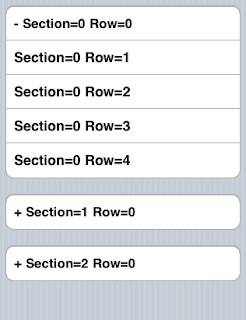最近剛好需要實作展開/收合的功能,效果如圖所示:
我是參考Expanding/Collapsing TableView Sections的實作,然後在自己簡化。
一個展開/收合的單位為一個Section,Row0表示Parent,Row1~N表示Child,程式碼中都有註解。
- testTableViewController.h
#import@interface MoodDiaryViewController : UITableViewController { /* Store the indexpath which already expanded */ NSMutableIndexSet *expandedSections; } @end
- testTableViewController.h
#import "testTableViewController.h"
@implementation MoodDiaryViewController
#pragma mark -
#pragma mark View lifecycle
- (void)viewDidLoad {
[super viewDidLoad];
if (!expandedSections)
{
expandedSections = [[NSMutableIndexSet alloc] init];
}
}
#pragma mark -
#pragma mark Table view data source
- (NSInteger)numberOfSectionsInTableView:(UITableView *)tableView {
// Return the number of sections.
return 3;
}
- (NSInteger)tableView:(UITableView *)tableView numberOfRowsInSection:(NSInteger)section {
/* Return the number of rows in the section. */
if ([expandedSections containsIndex:section]) {
/* Return all rows when expanded */
return 5;
} else {
/* Only top row showing */
return 1;
}
}
// Customize the appearance of table view cells.
- (UITableViewCell *)tableView:(UITableView *)tableView cellForRowAtIndexPath:(NSIndexPath *)indexPath {
NSString *CellIdentifier = [NSString stringWithFormat:@"Cell%d_%d", indexPath.section, indexPath.row];
UITableViewCell *cell = [tableView dequeueReusableCellWithIdentifier:CellIdentifier];
if (indexPath.row == 0) {
/* Parent cell */
if (cell == nil)
cell = [[[UITableViewCell alloc] initWithStyle:UITableViewCellStyleDefault reuseIdentifier:CellIdentifier] autorelease];
/* Change UI status */
if ([expandedSections containsIndex:indexPath.section]) {
cell.textLabel.text = [NSString stringWithFormat:@"- Section=%d Row=%d", indexPath.section, indexPath.row];
} else {
cell.textLabel.text = [NSString stringWithFormat:@"+ Section=%d Row=%d", indexPath.section, indexPath.row];
}
} else {
/* Child cell */
if (cell == nil)
cell = [[[UITableViewCell alloc] initWithStyle:UITableViewCellStyleSubtitle reuseIdentifier:CellIdentifier] autorelease];
cell.textLabel.text = [NSString stringWithFormat:@"Section=%d Row=%d", indexPath.section, indexPath.row];
}
return cell;
}
#pragma mark -
#pragma mark Table view delegate
- (void)tableView:(UITableView *)tableView didSelectRowAtIndexPath:(NSIndexPath *)indexPath {
/* If user choose the parent row */
if (indexPath.row == 0) {
NSInteger section = indexPath.section;
BOOL currentlyExpanded = [expandedSections containsIndex:section];
NSInteger rows;
NSMutableArray *arrRows = [NSMutableArray array];
if (currentlyExpanded) {
/* Child cell for this parent */
rows = [self tableView:tableView numberOfRowsInSection:section];
[expandedSections removeIndex:section];
} else {
[expandedSections addIndex:section];
rows = [self tableView:tableView numberOfRowsInSection:section];
}
/* Create child index path. Child path start frow index one */
for (int i = 1; i < rows; i++) {
NSIndexPath *tmpIndexPath = [NSIndexPath indexPathForRow:i inSection:section];
[arrRows addObject:tmpIndexPath];
}
UITableViewCell *cell = [tableView cellForRowAtIndexPath:indexPath];
/* Remove of insert above index path into tableview */
if (currentlyExpanded) {
[tableView deleteRowsAtIndexPaths:arrRows withRowAnimation:UITableViewRowAnimationTop];
cell.textLabel.text = [NSString stringWithFormat:@"+ Section=%d Row=%d", indexPath.section, indexPath.row];
} else {
[tableView insertRowsAtIndexPaths:arrRows withRowAnimation:UITableViewRowAnimationTop];
cell.textLabel.text = [NSString stringWithFormat:@"- Section=%d Row=%d", indexPath.section, indexPath.row];
}
} else { // For choosing child row
;
}
}
#pragma mark -
#pragma mark Memory management
- (void)didReceiveMemoryWarning {
// Releases the view if it doesn't have a superview.
[super didReceiveMemoryWarning];
// Relinquish ownership any cached data, images, etc. that aren't in use.
}
- (void)viewDidUnload {
// Relinquish ownership of anything that can be recreated in viewDidLoad or on demand.
// For example: self.myOutlet = nil;
}
- (void)dealloc {
[super dealloc];
}
@end


A6A2239970
回覆刪除Takipçi Satın Al
En İyi Filmler
SEO Paketleri